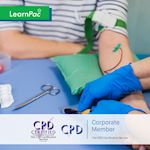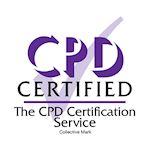Blood Transfusion Training for Healthcare Staff - Level 3 - Online Course - CPD Accredited
CPDUK Accredited | Instant Course Access | Includes Assessment & Certificate | Instant Certificate Download
LearnPac Systems
Summary
- Exam(s) / assessment(s) is included in price
- Tutor is available to students
Add to basket or enquire
Overview
Blood Transfusion Training for Healthcare Staff - Level 3 - Online Course - CPD Accredited.
Welcome to our online Blood Transfusion training course (blood component transfusion) for front-line healthcare professionals.
Using blood and blood components is a standard therapeutic procedure in NHS and private hospitals. Blood transfusion, if used safely and appropriately, will improve the quality of life or be a life-saving treatment for many patients.
Doctors and nurses, in particular, have an essential role in a safe blood transfusion. Therefore, registered nurses must have sufficient knowledge of the situations, amounts and methods of using blood components, possible side effects and necessary care of those receiving blood transfusions.
Certificate duration: 2 years
Entry requirements: No entry restrictions
Recommended prerequisites: N/A
Assessment type: End of course assessment
Assessment pass mark – 80% needed to pass and gain a CPD certificate
Cost(s) of assessment and certification – All costs included in the course price
Awarding/Accrediting body – CPD Certification Service (CPDUK)
Blood Transfusion Training for Healthcare Staff - Level 3 - Online Course - CPD Accredited.
CPD
Course media
Description
Course aims
The aims and objectives of this online Blood Transfusion training course are to improve the awareness and competencies of healthcare professionals who administer blood and products in various clinical settings.
Learning outcomes
On completion of this online Blood Transfusion training course, the learner will:
- Know the different blood groups,
- Understand why blood transfusions are clinically necessary,
- Know the risks and benefits associated with blood transfusions,
- Know the alternative treatments available if the patient refuses a blood transfusion,
- Know the potential adverse side effects and the things all healthcare staff should be aware of when caring for someone who has had a blood transfusion,
- Have an understanding of the critical checks clinical staff have to take before, during and after administering a blood transfusion.
What is blood transfusion?
Blood transfusion is generally the process of receiving blood or blood products into one’s circulation intravenously. Transfusions are used for various medical conditions to replace lost components of the blood.
Why is blood transfusion training important?
Using blood and blood components is a standard therapeutic procedure in NHS and private hospitals. Blood transfusion, if used safely and appropriately, will improve the quality of life or be a life-saving treatment for many patients. Doctors and nurses, in particular, have an essential role in a safe blood transfusion. Therefore, nurses must have sufficient knowledge of situations, amount and methods of using blood components, possible side effects and necessary cares.
What is covered in this course?
This online Blood Transfusion training course covers the following:
- The different blood groups and why people must get the correct blood group in a blood transfusion,
- Different types of blood products and their purposes,
- The purpose of a red cell transfusion, platelet transfusion and a Fresh Frozen Plasma (FFP) transfusion,
- ABO and the Rh D blood groups.
- How a patient’s blood group is determined,
- The difference between a group and screen sample and a crossmatch sample,
- The correct process of labelling blood samples,
- Why blood transfusions are sometimes clinically necessary,
- The risks and benefits associated with blood transfusions,
- Alternatives to blood transfusions – for example, oral iron tablets,
- The concerns patients may have about receiving a blood transfusion,
- The importance of gaining the patient’s consent for a blood transfusion and the reasons why some patients may refuse this treatment,
- The process associated with blood transfusion, including:
- Blood sample collection,
- The correct procedure of collection and transportation of blood components,
- Collecting a blood bag from the blood storage point,
- Safety checks,
- Blood product administration to a patient,
- Critical checks clinical staff must make and why they are required,
- The equipment needed for a blood transfusion.
- The safe process for the administration of different blood components,
- Potential adverse reactions to a blood transfusion,
- The risks of blood transfusion, including severe allergic reactions,
- Managing risks related to blood transfusions,
- Documentation about blood component transfusion.
Blood Transfusion Training for Healthcare Staff - Level 3 - Online Course - CPD Accredited.
Who is this course for?
This online Blood Transfusion training course is primarily aimed at those healthcare staff who are not directly involved in blood sampling, the decision to transfuse, or administering blood transfusions. However, senior clinical staff, including specialist nurses and doctors, will also find this course beneficial.
Healthcare staff who are specifically involved in the clinical decisions related to the blood transfusion process will receive more specialised training, and this may include completing the individual NHS Trust or private hospital’s internal classroom training or e-learning. Speak to your line manager or learning and development lead if you think this applies to you.
Blood Transfusion Training for Healthcare Staff - Level 3 - Online Course - CPD Accredited.
Requirements
Learn anywhere, anytime on any device
You will need access to a desktop computer, laptop, tablet or smartphone device to complete these online courses. You can start, pause/stop and return to where you left off.
Our courses utilise responsive design features, making them available on any device of your choice.
Blood Transfusion Training for Healthcare Staff - Level 3 - Online Course - CPD Accredited.
Career path
Our online courses and programmes range from introductory modules at Level 1 (awareness/beginner) to advanced and expert modules up to Level 6.
Our e-learning modules count towards CPD hours for professionals in various sectors as well as meeting mandatory and statutory requirements (where relevant).
Blood Transfusion Training for Healthcare Staff - Level 3 - Online Course - CPD Accredited.
Questions and answers
Currently there are no Q&As for this course. Be the first to ask a question.
Reviews
Currently there are no reviews for this course. Be the first to leave a review.
Legal information
This course is advertised on reed.co.uk by the Course Provider, whose terms and conditions apply. Purchases are made directly from the Course Provider, and as such, content and materials are supplied by the Course Provider directly. Reed is acting as agent and not reseller in relation to this course. Reed's only responsibility is to facilitate your payment for the course. It is your responsibility to review and agree to the Course Provider's terms and conditions and satisfy yourself as to the suitability of the course you intend to purchase. Reed will not have any responsibility for the content of the course and/or associated materials.





